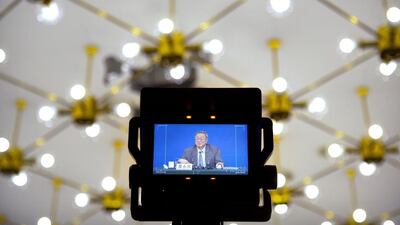Sentiment still remains the main driving force behind most market movements, just as it was at the start of the year. Back then the markets became irrationally consumed with fear about China, about oil prices and even about the US economy. Almost three months on and most of those concerns have dissipated, and been replaced to varying degrees by optimism. While the improvement in sentiment makes a welcome change, the justification for the rallies going much further is more questionable without fresh information.
With China and the oil price seemingly in a better place, the markets have enjoyed a few positive weeks.
China’s National People’s Congress has lowered its growth target for this year slightly to a range of 6.5 to 7 per cent to afford it more flexibility to deal with the downturn. It has also allowed a modest increase in the budget deficit-GDP ratio to 3 per cent, and the People’s Bank of China has cut banks’ reserve requirements ratios. Most importantly it has pledged to maintain broad exchange rate stability, which reduces the risk of deflation being exported to other parts of the world. Oil prices have also benefited from the sentiment value of an agreement to freeze oil production between various Opec and non-Opec countries. US oil production is at its lowest since late 2014 and the oil rig count is down 75 per cent from its peak. Oil prices may in fact have been through the worst of the year, and markets are speculating about how much further they can rise. GCC markets have benefited with equities rising and credit markets rallying despite recent ratings downgrades.
The US economic data has, on balance, been better as well and the markets are reviewing their expectations of Fed rate hikes. Rather than pricing out completely a move by the Federal Reserve this year, it looks as though a move in June is now becoming a possibility again.
Core inflation in the US now stands at 1.7 per cent, and the Fed’s influential vice chairman Stanley Fischer has warned about the “first stirrings” of inflation starting as the economy nears full employment. Jobs growth remained firm last month, although earnings fell. Another problem lies with productivity, as improvements in the labour market are not feeding through to raise overall output, and have not been doing so for some time.
Also, global growth prospects are still unclear with the global PMI index sitting right on cusp of the break even level of 50. PMIs in Japan, China, the euro zone and the United Kingdom continue to slip, albeit at a modest pace, and the G20 has warned about a potential shock to the world economy coming from Brexit.
Doubts about the effectiveness of negative interest rates are also increasing, even as the European Central Bank has moved to cut its deposit rate further into negative territory, taking it down to -0.4 per cent. The Bank of Japan (BoJ) could do the same in the coming week, although the options facing the BoJ are becoming more limited with yields negative all the way out to 10 years.
The markets will also await the message from the Fed in the coming week to see if Janet Yellen begins to tee up another rate hike in coming months. The Bank of England and the Swiss National Bank (SNB) are both expected to keep policy on hold, but it cannot be ruled out that the SNB (the first major central bank to go negative last year and having the most negative rates currently at -0.75 per cent) could still be forced to cut interest rates again to ward off unwelcome strength in the Swiss franc on the back of the ECB’s latest move.
The unintended consequences of negative interest rates thus continue to be felt, which could ultimately give way to pressure for more currency devaluations down the road.
For the time being the markets appear to have found a new equilibrium, but with much of this improvement a rejection of the extreme pessimism of early January it is too early to conclude that it is saying anything more overtly bullish. The upcoming data will probably determine whether these recent rallies have legs, but for the time being investors are probably right to remain cautious.
Tim Fox is the chief economist and head of research at Emirates NBD.
business@thenational.ae
Follow The National's Business section on Twitter


